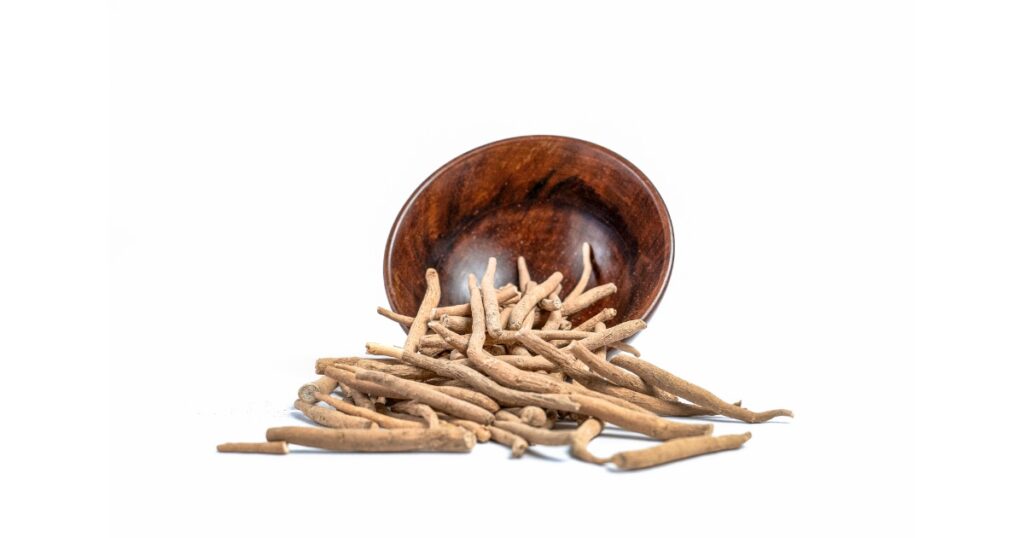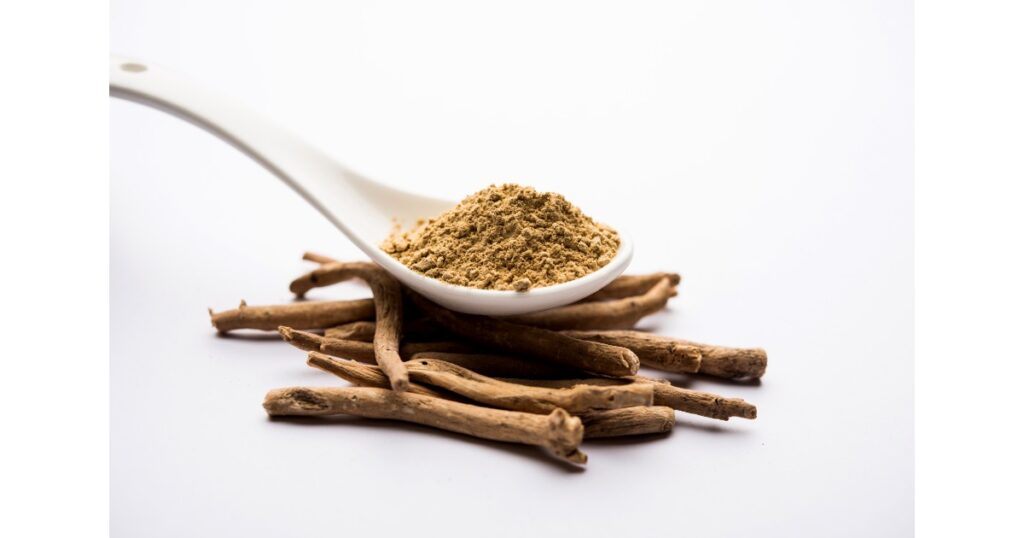In the world of wellness and holistic health, there is a timeless herb that has always been successful in grabbing the attention for vitality and balance – Ashwagandha.
This adaptogenic herb is celebrated for its ability to adapt to the unique needs of your body. Once it becomes a part of your daily diet, you may expect a multitude of health benefits including enhanced stress resilience, improved cognitive function, and a strengthened immune system.
This comprehensive guide will help you explore the captivating world of ashwagandha powder, its diverse uses, and the secrets behind its rising popularity.
Lets’ begin!
Table of Contents
What is Ashwagandha?
Ashwagandha, scientifically known as Withania somnifera, is a herb deeply rooted in Indian Ayurveda. Also known as “Indian ginseng” or “winter cherry,” this herb has been employed for centuries to enhance overall well-being.
The name “Ashwagandha” translates to “smell of the horse,” a nod to its unique aroma and the belief that consuming it imparts the strength and vitality of a horse.
Renowned for its adaptogenic properties, ashwagandha aids the body in managing stress by modulating the production of stress hormones. Its rich antioxidant content contributes to immune system support, while its anti-inflammatory effects promote joint health.
Furthermore, ashwagandha is lauded for its potential to improve cognitive function, memory, and sleep quality.
As a versatile herb, it can be consumed in various forms, with ashwagandha powder being a popular choice for supplementation.
Ashwagandha Benefits & Medicinal Uses

Here are some scientifically proven health benefits of ashwagandha for men and women.
Stress Management and Adaptogenic Properties
Ashwagandha stands out as a powerful adaptogen, helping the body adapt to stressors and normalize physiological functions.
In the chaotic rhythm of modern life, ashwagandha acts as your ally, helping your body adapt to stressors and keep cortisol – the stress hormone – in check1.
So, whether it is work deadlines, traffic jams, or everyday pressures, ashwagandha steps in to keep your mind calm and collected, promoting a sense of balance in your daily hustle.
Incorporating ashwagandha into your routine may contribute to a calmer, more resilient mind.
Immune System Support
Rich in antioxidants, ashwagandha enhances the body’s defense against oxidative stress and supports a robust immune system2.
Packed with antioxidants, it is your daily defense against free radicals.
By strengthening your immune system, ashwagandha empowers your body to fight against common colds, infections, and daily wear and tear, helping you stay vibrant and healthy.
Cognitive Function Enhancement
Ashwagandha has been linked to improved cognitive function, including enhanced memory, focus, and mental clarity.
Need to ace that presentation or remember where you left your keys? Ashwagandha steps in to enhance your memory, focus, and mental clarity, supporting your brainpower.
Its neuroprotective properties may help prevent nerve cell damage, offering potential benefits for those seeking cognitive support and age-related cognitive decline prevention.
Anti-Inflammatory Effects and Joint Health
Inflammation can be a daily foe, causing discomfort and limiting your movements.
Ashwagandha acts as a natural anti-inflammatory ally, helping to ease joint issues, so you can move freely and comfortably. This not only supports joint health but may also alleviate symptoms associated with conditions like arthritis, promoting greater mobility.
Improved Sleep Quality
Ashwagandha has been traditionally used as a natural remedy for sleep-related issues. Its adaptogenic nature helps regulate the sleep-wake cycle, promoting restful sleep.
Incorporating it into your bedtime routine may contribute to better sleep quality and overall sleep hygiene.
Hormonal Balance
For both men and women, ashwagandha has demonstrated the ability to balance hormones.
In men, it may support testosterone levels, while in women, it may aid in managing hormonal fluctuations associated with the menstrual cycle.
This hormonal equilibrium may contribute to overall reproductive health.
Energy and Vitality Booster
Ashwagandha is revered for its revitalizing properties, providing a natural energy boost.
By combating fatigue and supporting adrenal function, it helps individuals maintain sustained energy levels throughout the day, promoting a sense of vitality and well-being.
No more midday sluggishness, this herb keeps you charged and energized.
Blood Sugar Regulation
Emerging research suggests that ashwagandha may play a role in stabilizing blood sugar levels. This can be particularly beneficial for individuals with diabetes or those looking to manage and prevent insulin resistance, supporting overall metabolic health.
Whether you are managing diabetes or simply aiming for metabolic balance, ashwagandha may support your journey.
Anxiolytic and Mood-Enhancing Effects
With anxiolytic properties, it aids in anxiety relief and encourages a happy mood3.
Studies suggest that it has the potential to help individuals dealing with anxiety and mild depressive symptoms. By modulating neurotransmitters like serotonin, it may contribute to a more positive mood and emotional well-being.
Reproductive Health and Fertility
In traditional Ayurvedic medicine, ashwagandha has been used to support reproductive health4.
It may enhance fertility in both men and women, promoting a healthy reproductive system and addressing factors that could impact conception.
Tips to Choose the Best Ashwagandha Powder

Ashwagandha supplements are widely available in various forms like powder, tablets, and capsules. If you planning to take them, consider these tips before buying any ashwagandha supplement.
- Look for Standardized Extracts: Ensure that the ashwagandha supplement you choose contains standardized extracts. This means the product has key active compounds, such as withanolides, ensuring you receive a reliable and potent dose with each serving.
- Can Consider KSM-66 Form: KSM-66 is a specific branded form of ashwagandha. It is produced using a unique extraction process that maintains the full spectrum of bioactive compounds naturally present in the ashwagandha. KSM-66 is derived exclusively from the root of the ashwagandha plant, which is traditionally considered the most potent part. By focusing on the root, KSM-66 ensures a higher concentration of active compounds compared to supplements that may include other plant parts.
- Check for Third-Party Testing: Choose a brand that conducts third-party testing on its ashwagandha powder.
- Assess Colour and Smell: Ashwagandha powders can be assessed with colour and smell as they typically have a light beige to brown colour and a characteristic pungent smell. Be wary of unusually bright colour powders, as they may indicate poor quality or contamination.
- Check for Additives and Fillers: Review the ingredient list to ensure the ashwagandha powder or tablet is free from unnecessary additives, fillers, or preservatives. A clean ingredient list reduces the risk of allergic reactions and ensures you’re getting a pure product.
- Prefer Reputed Brands: Choose a reputable brand with a history of producing high-quality herbal supplements.
How to Take Ashwagandha Powder?

Ashwagandha supplements come in multiple forms like tablets, capsules, and powders, or churna.
You can simply take capsules or tablets with milk or water. However, powder form offers a few more ways to consume.
- You can add half a teaspoon of powder in a glass of lukewarm water until it dissolves, and consume it on an empty stomach for optimal absorption.
- It can also be mixed in lukewarm milk and taken at bedtime. You can sweeten it with honey or add a pinch of cinnamon for flavour.
- You can enjoy it in tea form by steeping the powder in hot water. Add 1/2 to 1 teaspoon of ashwagandha powder to a cup of hot water, let it steep for 5-10 minutes, and strain before drinking.
- It can also be added to yogurt, milk or plant-based smoothies.
What is the Right Ashwagandha Dosage?
The right dosage of ashwagandha typically depends on factors like age, medical condition, health goal, and many more. Studies suggest the range may vary between 300-500 mg daily.
However, it is crucial to consult your doctor or a health expert before taking any supplement.
What is the Best Time to Take Ashwagandha?
The best time to take it may vary from person to person depending on the health goal.
You may take it early morning empty stomach, post meals or at bed time. Regardless of the time you choose, consistency in your ashwagandha routine is essential.
Ashwagandha Side Effects
This herb is generally well-tolerated by most individuals without any side effects. However, some people may experience mild effects like abdominal discomfort, diarrhoea or nausea on consuming ashwagandha in high doses.
Although rare, some people might be allergic to ashwagandha.
Ashwagandha may interact with certain medications, including sedatives and medications for diabetes and blood pressure. Therefore, it is better to consult with your healthcare provider before taking this herb as they can provide personalized advice based on your health status and potential interactions.
Shilajit vs Ashwagandha: Which is Better?
This is a very common question that many health experts face.
Shilajit and Ashwagandha are both popular Ayurvedic herbs known for their potential health benefits, but they serve different purposes and have distinct characteristics. Therefore, the choice should depend on your specific health goals and needs.
Ashwagandha is renowned for its potential to help the body adapt to stress and promote overall balance. It also helps improve sleep quality, energy levels, cognitive function, and overall vitality.
Shilajit is a sticky resin and is often associated with enhancing energy, stamina, and physical performance. It is used to combat fatigue and promote vitality. Due to its antioxidant content, Shilajit is believed to have anti-aging properties and is thought to support overall longevity.
Which is Better?
- If your primary concern is stress management and anxiety reduction, ashwagandha may be a better choice.
- If you are looking to boost physical energy, stamina, and overall vitality, Shilajit might be more suitable.
- Ashwagandha has more evidence supporting its potential cognitive benefits, making it a better choice if cognitive function is a priority.
- Shilajit is traditionally associated with male reproductive health, so if this is a specific concern, it might be the preferred option.
Some individuals may choose to take both of these herbs.
Consulting with a healthcare professional before incorporating these herbs into your routine, especially if you have underlying health conditions or are taking medications, is advisable.
Summary
In conclusion, Ashwagandha powder stands as a potent and versatile herbal remedy. Its remarkable properties make it a go-to solution for those seeking balance and resilience in the face of life’s stressors.
As we have explored the various uses, from simple water or milk to inclusion in smoothies or teas, incorporating ashwagandha into your daily routine is easy.
Remember, the right dosage is crucial, and consulting with a healthcare professional ensures a tailored approach that aligns with your health goals.
May your well-being flourish with the support of Ashwagandha’s numerous benefits.
Frequently Asked Questions
What are some ashwagandha benefits for men?
Ashwagandha benefits for men include potential support for reproductive health, improved sexual function, reduced stress, enhanced physical performance, and cognitive support. It may also contribute to muscle growth and increased vitality.
What are some ashwagandha benefits for female?
Ashwagandha benefits for women include stress reduction, hormonal balance, improved mood, and enhanced reproductive health. It may alleviate symptoms of PMS and menopause, support fertility, and boost overall well-being.
Does ashwagandha increase height?
There is no scientific evidence to support the claim that ashwagandha increases height. Height gain primarily depends on the genetic factors.
What are the benefits of ashwagandha powder with milk?
Milk has calming properties, and when combined with ashwagandha, it may amplify the herb’s stress-relieving and relaxation benefits, making it a suitable for bedtime. It may also contribute to bone health due to the presence of calcium in milk and the potential bone-strengthening effects associated with this herb.
How to consume ashwagandha?
One can consume it by adding it to water, milk, shakes, smoothies or as a herbal tea.
What are some ashwagandha benefits for skin?
It contains compounds with anti-inflammatory and antioxidant properties, which may help soothe, calm the skin and protect from oxidative stress. Additionally, it may also support collagen production and help retain skin moisture.
Does ashwagandha increase testosterone?
There is some evidence to suggest that ashwagandha may have a positive impact on testosterone levels owing to its tress-reducing properties as chronic stress is known to be associated with reduced testosterone levels.
Is ashwagandha safe?
It is generally considered safe and well-tolerated when used responsibly. However, individual factors, health conditions, and interactions with medications should be taken into account.
Does ashwagandha increase weight?
It is not associated with weight gain but may support healthy weight management. When paired with proper diet and workout, it may promote muscle growth and improve overall body composition.
Which is the best ashwagandha brand?
Market is flooded with many good quality brands. You can choose any product which has undergone third-party testing for purity and potency and is made in compliance with good manufacturing practices (GMP) for quality assurance.
Is ashwagandha safe for daily use?
Yes, it is generally considered safe for daily use when taken in recommended doses.
How long does it take for ashwagandha to show results?
The time it takes to experience the benefits of ashwagandha can vary. Some people may notice improvements in stress and energy levels within a few weeks, while others may take longer. Consistency in usage is key.
What is the best way to take ashwagandha for anxiety?
The optimal method may vary from person to person. You may take either in the morning or at bed time.
Can ashwagandha help with sleep?
Yes, Ashwagandha is believed to have calming effects that may contribute to improved sleep quality.
Can I take it with other supplements or medications?
It is recommended to consult with a healthcare professional before combining ashwagandha with other supplements or medications.
Sources
- Singh, N., Bhalla, M., De Jager, P., & Gîlcă, M. (2011). An overview on Ashwagandha: A rasayana (Rejuvenator) of Ayurveda. African Journal of Traditional, Complementary and Alternative Medicines, 8(5S). https://doi.org/10.4314/ajtcam.v8i5s.9 ↩︎
- Tharakan, A., Shukla, H., Benny, I. R., Tharakan, M., George, L. K., & Koshy, S. (2021). Immunomodulatory Effect of Withania somnifera (Ashwagandha) Extract—A Randomized, Double-Blind, Placebo Controlled Trial with an Open Label Extension on Healthy Participants. Journal of Clinical Medicine, 10(16), 3644. https://doi.org/10.3390/jcm10163644 ↩︎
- Salve, J., Pate, S., Debnath, K., & Langade, D. (2019). Adaptogenic and anxiolytic effects of ashwagandha root extract in healthy adults: a double-blind, randomized, placebo-controlled clinical study. Cureus. https://doi.org/10.7759/cureus.6466 ↩︎
- Azgomi, R. N. D., Zomorrodi, A., Nazemyieh, H., Fazljou, S. M. B., Bazargani, H. S., Nejatbakhsh, F., Jazani, A. M., & AsrBadr, Y. A. (2018). Effects ofWithania somniferaon Reproductive System: A Systematic Review of the Available Evidence. BioMed Research International, 2018, 1–17. https://doi.org/10.1155/2018/4076430 ↩︎
